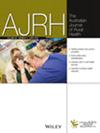Reframing Nurse Education in Rural Australia: Implications for Advancing Longitudinal Integrated Placements
Abstract
Objective
To explore the experiences of final-year pre-registration nursing students undertaking a longitudinal integrated placement in rural Australia.
Setting
Rural primary health care settings in far west NSW and northwest Victoria, Australia.
Participants
Thirteen final year pre-registration nursing students comprised two pilot cohorts undertaking the placement in semester one (n = 7) and two (n = 6) of 2022.
Design
A descriptive qualitative study design using semi-structured individual interviews with transcripts analysed using reflexive thematic analysis.
Results
Three themes were generated from the data: Experiencing comprehensive care, Making connections and Engaging with complexity. The subtheme of rural curriculum is described for each theme.
Conclusion
Findings highlight the importance of longitudinal integrated placements for student nurse exposure to comprehensive care, mitigating previous experiences of episodic and fragmented care associated with short duration placements across multiple settings. Placement duration enabled students to establish connections with their peers, health care teams, and the communities in which placements were undertaken. Student exposure to complexity-informed practice extended their capacity to interpret and respond to the broader inequities experienced and complexity as it relates to nursing practice in rural contexts. There is an imperative to reframe Australia's commitments to national nursing workforce policy, curriculum and clinical education to transform nursing education and maximise the full potential of our nursing workforce. These reforms must include consideration for the design, implementation, and scalability of rurally embedded longitudinal integrated placements, informed by rural curriculum, to enable the development of a competent future rural nursing workforce to address critical workforce shortages.

 求助内容:
求助内容: 应助结果提醒方式:
应助结果提醒方式:


